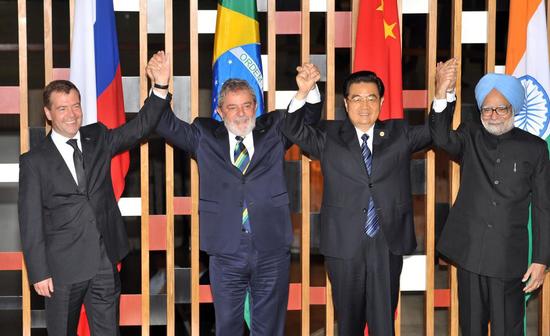The BRIC label shows (…) the key characteristic of the current global transformation: The paradigm that developing countries cannot be relevant actors is no longer true.
Roberto Jaguaribe, Brazil’s Sherpa to the 2009 and 2010 BRICS Summits
———–
As Brazil is gearing up for the 9th BRICS Summit in Xiamen, it is worth looking back to the 2010 BRIC Summit in Brasília. Why was the summit important and what were its lessons?
The 2nd BRIC Summit was crucial for the grouping in many ways. During the debates in Brasília, leaders agreed to increase ‘intra-BRICs cooperation’ in an attempt to strengthen ties on different levels of government and civil society. On April 14, the Brazilian think tank IPEA hosted the first institutionalized BRIC Academic Forum in Brasília, which brought academics and policy analysts from the four member countries together to develop joint ideas about how to strengthen cooperation.
On the same day, in Rio de Janeiro, the first BRICS Business Forum took place. Finally, the second meeting of BRICS national security advisors occurred in Brasília on 15 April. Since Brazil had also hosted the IBSA (India, Brazil and South Africa) Summit a day earlier, South Africa’s President Zuma was able to hold bilateral meetings with all BRIC leaders, in an – ultimately successful – attempt to include his country in the BRICS grouping. By then, the BRIC grouping had already received formal and informal membership requests by several other countries, such as Mexico, Indonesia and Turkey.
In their declaration, broader than the final document in 2009, the BRIC leaders supported the recent changes in the landscape of global financial governance:
We welcome the fact that the G-20 was confirmed as the premier forum for international economic coordination and cooperation of all its member states. Compared to previous arrangements, the G-20 is broader, more inclusive, diverse, representative and effective. We call upon all its member states to undertake further efforts to implement jointly the decisions adopted at the three G-20 Summits.
In addition, they expressed their dissatisfaction with the lack of reform in the World Bank and the IMF:
We will strive to achieve an ambitious conclusion to the ongoing and long overdue reforms of the Bretton Woods institutions. The IMF and the World Bank urgently need to address their legitimacy deficits. Reforming these institutions’ governance structures requires first and foremost a substantial shift in voting power in favor of emerging market economies and developing countries to bring their participation in decision making in line with their relative weight in the world economy.
As mentioned above, the Brasília summit took place in the context of a significant proliferation of intra-BRICs activities. As the declaration, showed, the participants
welcome the following sectoral initiatives aimed at strengthening cooperation among our countries:
a. The first Meeting of Ministers of Agriculture and Agrarian Development;
b. The Meetings of Ministers of Finance and Governors of Central Banks;
c. The Meetings of High Representatives for Security Issues;
d. The I Exchange Program for Magistrates and Judges, of BRIC countries, held in March 2010 in Brazil following the signature in 2009 of the Protocol of Intent among the BRIC countries’ Supreme Courts;
e. The first Meeting of Development Banks;
f. The first Meeting of the Heads of the National Statistical Institutions;
g. The Conference of Competition Authorities;
h. The first Meeting of Cooperatives;
i. The first Business Forum;
j. The Conference of think tanks.
Finally, the four rising powers included a suggestion Mr. Medvedev made in the run-up to the summit, declaring that in order to facilitate trade and investment, “we will study feasibilities of monetary cooperation, including local currency trade settlement arrangement between our countries.
At the end of the summit, there seemed to be a sense of growing institutionalization. Contrary to the first summit a year ago, there was now certainty that heads of state would reconvene a year later in China. And indeed, in the following summits, no national leader would fail to participate.
The yearly summits in the years that followed were the most visible proof of the grouping’s institutionalization – in 2014, none of the participants had been in power in 2010, suggesting that each country’s BRICS membership is no longer tied to any specific personality (Manmohan Singh, India’s former Prime Minister, is the only leader to have attended all of the first five BRICS Summits).
In Xiamen, greater Chinese influence will be amplified this year by the fact that the summit host enjoys, by definition, greater freedom to articulate the grouping’s narrative during the year-long presidency. China’s top foreign policy priority at this stage is to consolidate and substantiate its regional leadership ambitions, so it can be expected that the BRICS presidency and the Xiamen summit will be used with this goal in mind. Specifically, this means that China will most likely give special emphasis to the so-called outreach-process, initiated by the South African government during the 2013 Summit, when Pretoria invited countries in the region to participate in parts of the summit.
Read also:
BRICS Summit is Chance to Strengthen Brazil’s Global and Regional Ties
BRICS: There Is More Than Just the Summits
Argentina is not a BRICS country – even if it grew 10% per year
Photo credit: Jose Cruz/ABr









